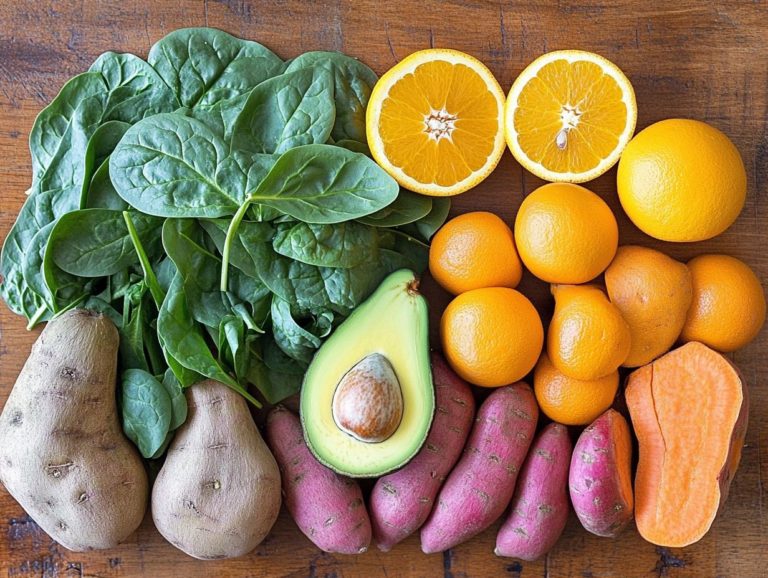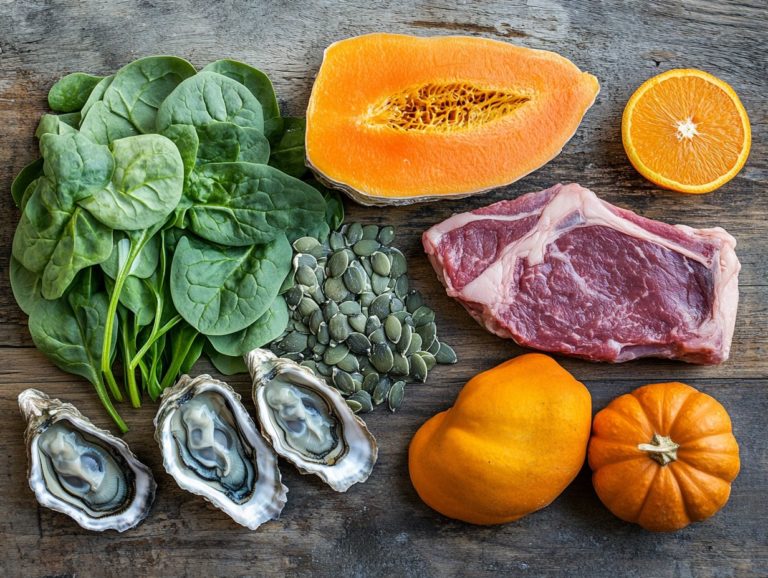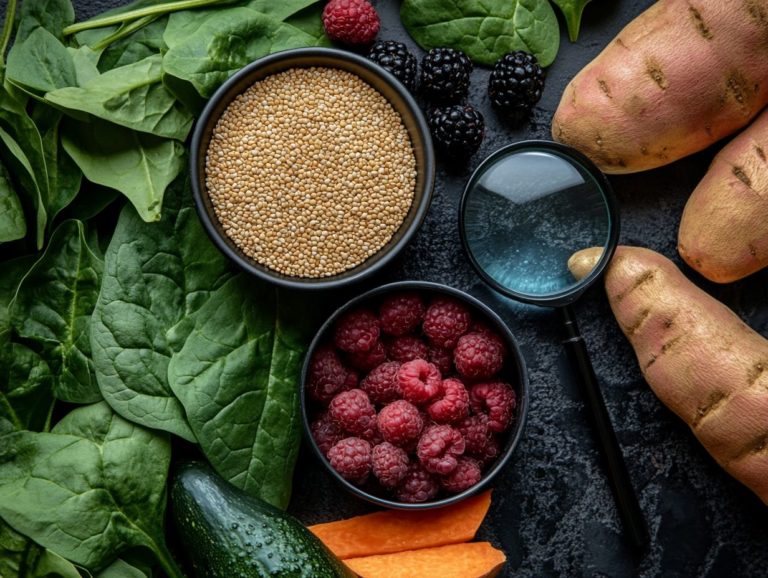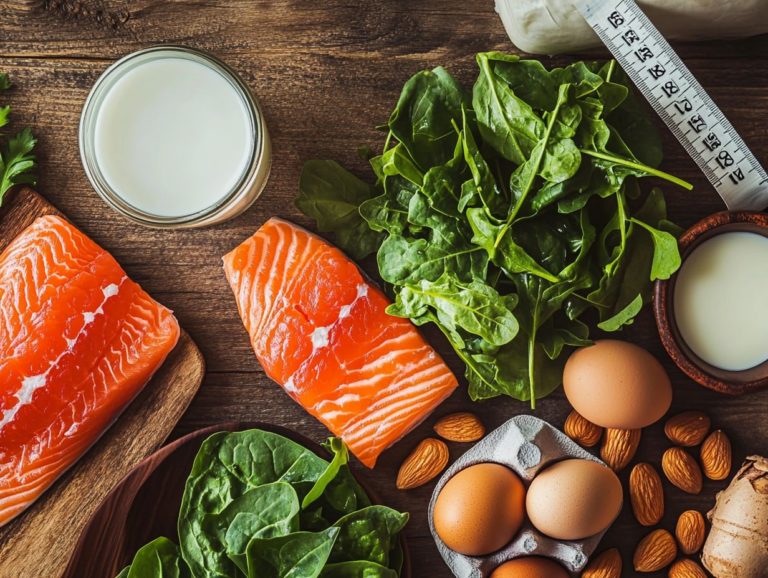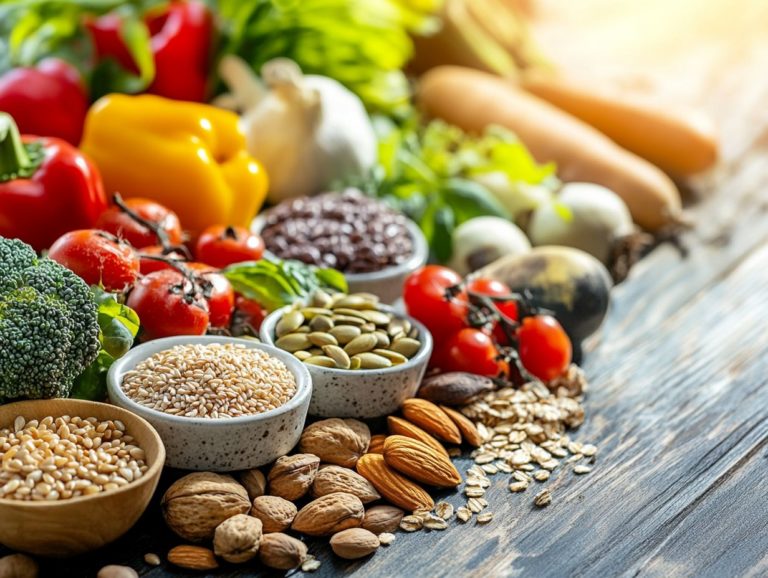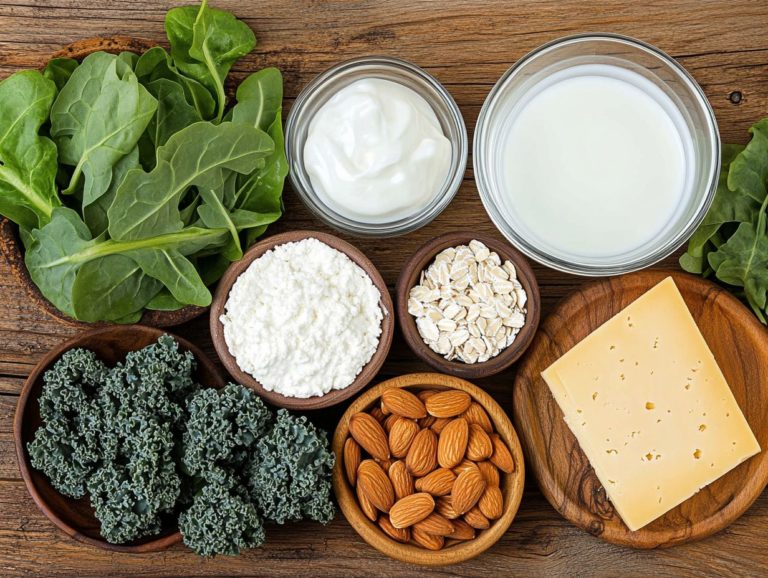5 Foods to Get Your Daily Zinc Intake
Zinc is essential for maintaining your health, playing a pivotal role in everything from immune function to wound healing. Yet, many overlook this vital mineral in their diets.
This article delves into five outstanding foods rich in zinc, including oysters, beef, pumpkin seeds, chickpeas, and yogurt. It will also cover what zinc is, why it s important for your well-being, daily requirements, symptoms of deficiency, potential risks of excessive intake, and practical ways to incorporate these foods into a balanced diet.
Get ready to boost your nutrition now!
Contents
- Key Takeaways:
- 1. Oysters
- 2. Beef
- 3. Pumpkin Seeds
- 4. Chickpeas
- 5. Yogurt
- What Is Zinc and Why Should You Care?
- Frequently Asked Questions
- What are the 5 foods recommended for getting daily zinc intake?
- Why is it important to get enough zinc in our daily diet?
- How much zinc do we need in our daily diet?
- Can vegetarians and vegans get enough zinc in their diet?
- Are there any risks associated with consuming too much zinc?
- What are some signs of zinc deficiency?
Key Takeaways:
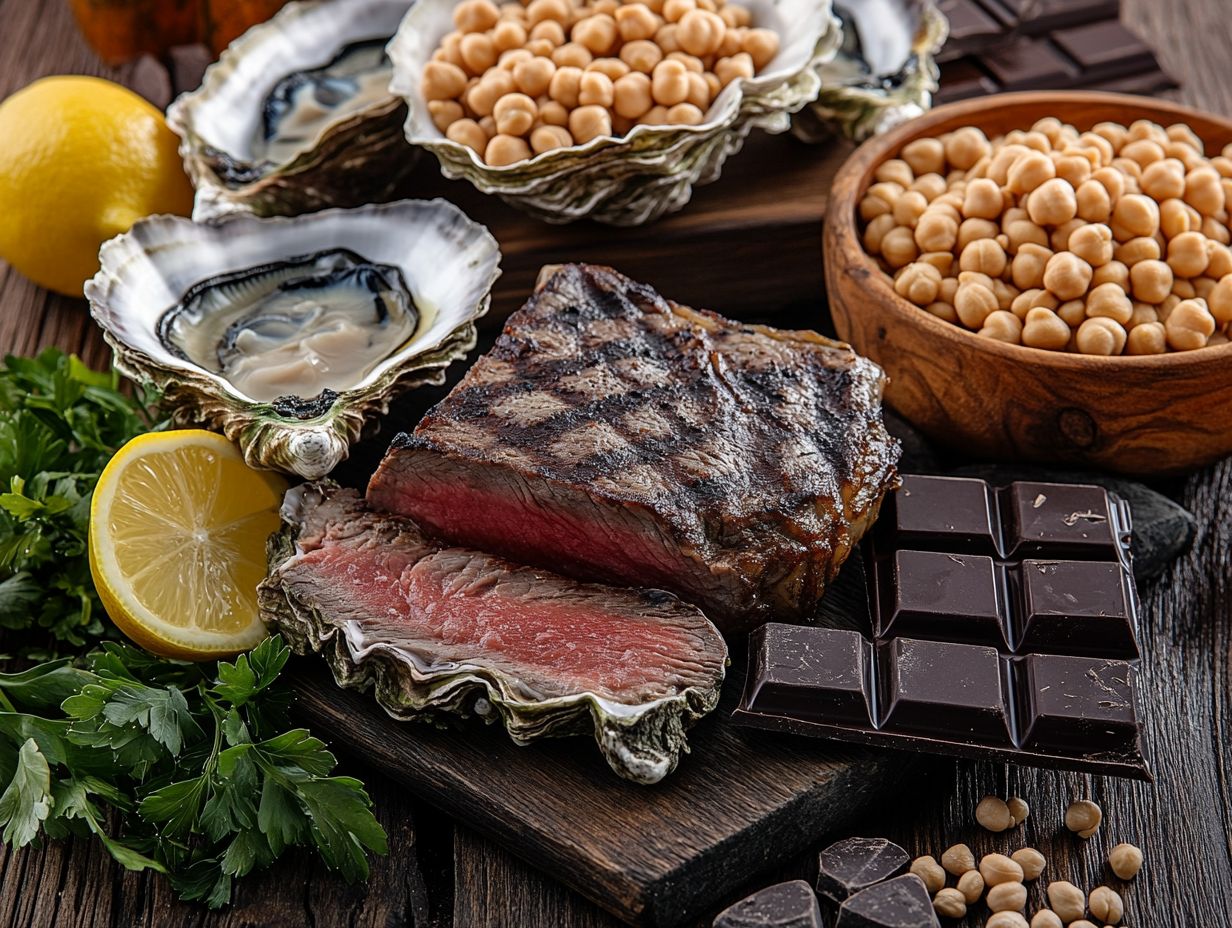
Get your daily dose of zinc with these 5 foods: oysters, beef, pumpkin seeds, chickpeas, and yogurt. Zinc is essential for the body: it helps your immune system by producing immune cells, aids in wound healing, and supports cell growth. For more information on how to boost your intake, check out the top 10 foods rich in zinc for immune support. Don’t skimp on zinc: adults need 8-11 mg daily. Symptoms of deficiency include a weakened immune system and hair loss.
1. Oysters
Oysters are a true powerhouse of zinc. This vital mineral plays a significant role in immune function, wound healing, and overall health.
If you’re looking to enrich your diet with this essential nutrient, oysters are a great choice. With about 74 mg of zinc in just a 3-ounce serving, they rank among the most concentrated sources of this crucial mineral.
This impressive zinc content not only helps your immune system by producing immune cells, but also facilitates rapid recovery from injuries through efficient wound healing processes.
Research indicates that zinc can help combat age-related macular degeneration, a leading cause of vision loss, enhancing your overall well-being.
Experts like Anthea Levi and Barbie Cervoni emphasize the importance of incorporating zinc-rich foods, such as oysters, into your diet to fully reap these health benefits.
2. Beef
Beef isn t just a mouthwatering source of protein; it s also a powerhouse of zinc, crucial for nutrient absorption and fulfilling your daily requirements, making it an essential part of a healthy diet.
Regarding different cuts, consider lean sirloin or ribeye each offers a delicious way to increase your zinc intake. This mineral plays a pivotal role in boosting your immune system, especially if you’re dealing with digestive disorders that hinder nutrient absorption.
Zinc also supports cell division, promoting overall health and recovery. By incorporating beef into your balanced diet, you can ensure that you meet your nutritional needs while relishing every satisfying bite.
3. Pumpkin Seeds
Pumpkin seeds are an exceptional plant-based source of zinc, making them a valuable addition to your diet, especially if you re seeking dietary sources of this essential mineral. Their remarkable zinc content competes with certain animal-based options, offering an excellent alternative for those following a vegetarian or vegan lifestyle.
This mineral is crucial for strengthening your immune system, as it plays a vital role in the development and function of immune cells. Incorporating pumpkin seeds into your daily meals is effortless.
- You can easily sprinkle them on salads for an added crunch.
- Blend them into smoothies for a creamy texture.
- Mix them into your breakfast bowls.
This not only enhances flavor but also maximizes nutritional benefits, supporting your overall health and well-being.
4. Chickpeas
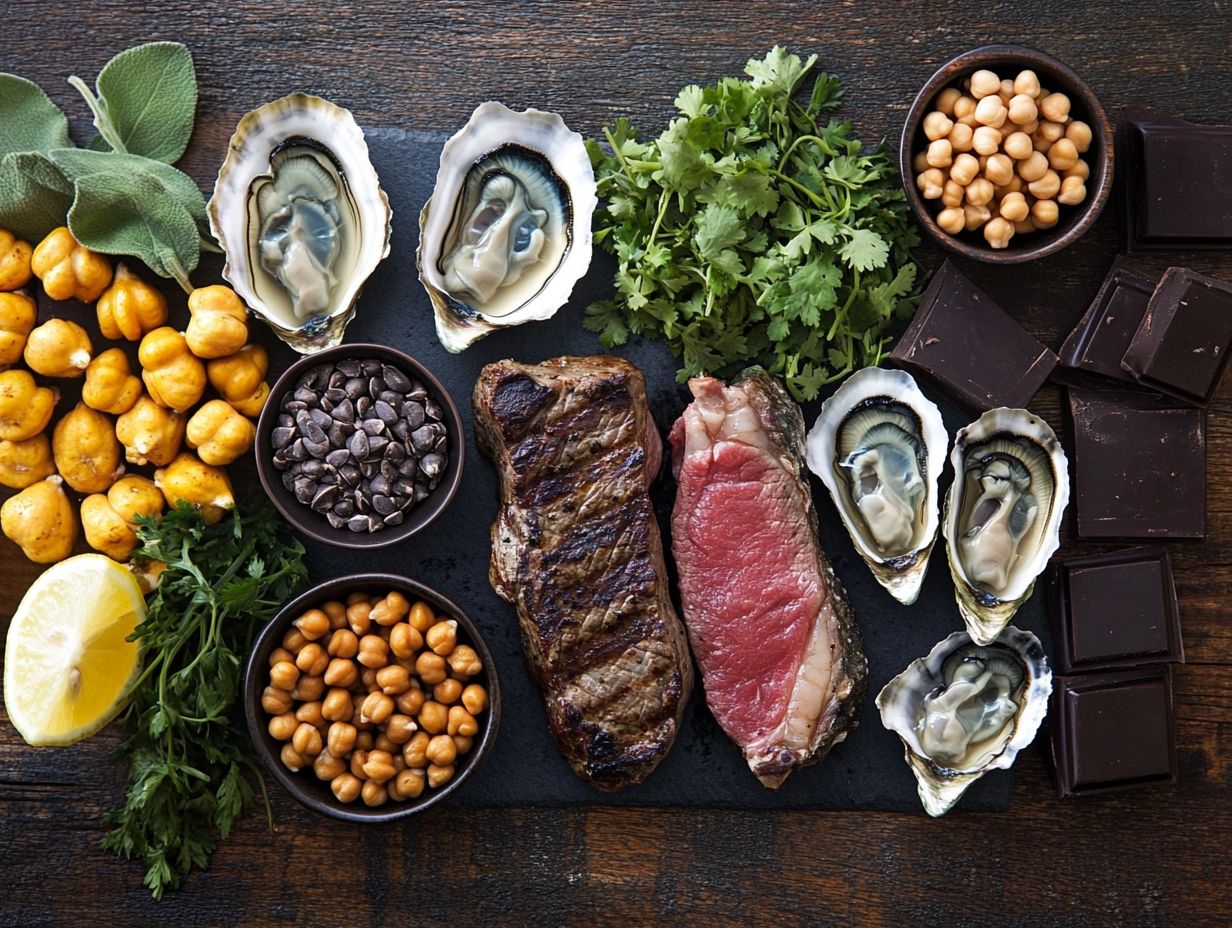
Chickpeas are an exceptional vegan source of zinc, crucial for maintaining a robust immune system and promoting overall health, making them an essential ingredient in your healthy diet.
Beyond their impressive zinc content, chickpeas offer a rich nutritional profile packed with protein, fiber, and essential vitamins and minerals. Their versatility allows you to incorporate them into a wide range of recipes, from hearty stews to creamy hummus, catering to diverse palates and culinary styles.
For those following a plant-based diet or managing digestive disorders, chickpeas provide a convenient solution for addressing zinc deficiency, ensuring that your nutritional needs are met while still enjoying delightful meals.
Their remarkable ability to blend seamlessly into both savory and sweet dishes further enhances their appeal, making them a staple in any health-conscious pantry.
Start adding these zinc-rich foods to your meals today for a healthier you!
5. Yogurt
Yogurt is not just a delicious treat; it s a powerhouse of probiotics that supports your digestive health. It also serves as a valuable source of zinc, which is essential for nutrient absorption and overall well-being. Incorporating yogurt into your diet is a smart choice for elevating your health.
Zinc in yogurt is important for your immune system. This is especially helpful for those with digestive disorders. Its anti-inflammatory properties can soothe gastrointestinal issues and enhance your overall comfort.
As you explore various options Greek, regular, or plant-based you ll find that each type has distinct nutritional profiles. For instance, Greek yogurt often has higher protein content, while dairy-free alternatives may offer extra vitamins.
With such a range of benefits, yogurt stands out as a versatile addition to your diet, catering to diverse health needs and preferences.
What Is Zinc and Why Should You Care?
Zinc is a vital mineral that plays a crucial role in many bodily functions. It supports your immune system, aids in cell division (the process of cells making copies of themselves), and helps mitigate oxidative stress. This makes it essential for your overall health especially if you have health conditions like Crohn s Disease or Sickle Cell Disease.
This mineral is particularly important for immune function, as it boosts the activity of T cells, which orchestrate your body s defenses against pathogens. Zinc also contributes to wound healing by supporting new cell generation and tissue repair, which is beneficial for anyone with chronic wounds.
You can find zinc in several common dietary sources, including:
- Meat
- Shellfish
- Legumes
- Seeds
- Nuts
- Dairy
- Whole grains
A deficiency in zinc can lead to issues like weakened immunity, impaired wound healing, and increased susceptibility to infections. The recommended daily allowance varies by age and gender, highlighting the importance of maintaining adequate zinc levels for your overall health.
How Much Zinc Do We Need Daily?
Determining your daily zinc needs is essential for optimal health. The recommended daily allowance varies based on factors like age, gender, and specific health conditions to ensure you receive enough zinc for immune function and overall well-being.
For example, adult men typically need about 11 mg per day, while adult women generally require around 8 mg. If you’re pregnant or lactating, your needs will likely be higher.
Keep in mind that certain factors can affect zinc absorption. Phytates in whole grains and legumes can bind to zinc and inhibit its uptake. Some medical conditions may further hinder absorption.
Zinc is crucial for preventing deficiencies that can increase your susceptibility to infections, delay wound healing, and even affect growth in children. This underscores its importance in supporting immune health throughout your life.
What Are the Symptoms of Zinc Deficiency?
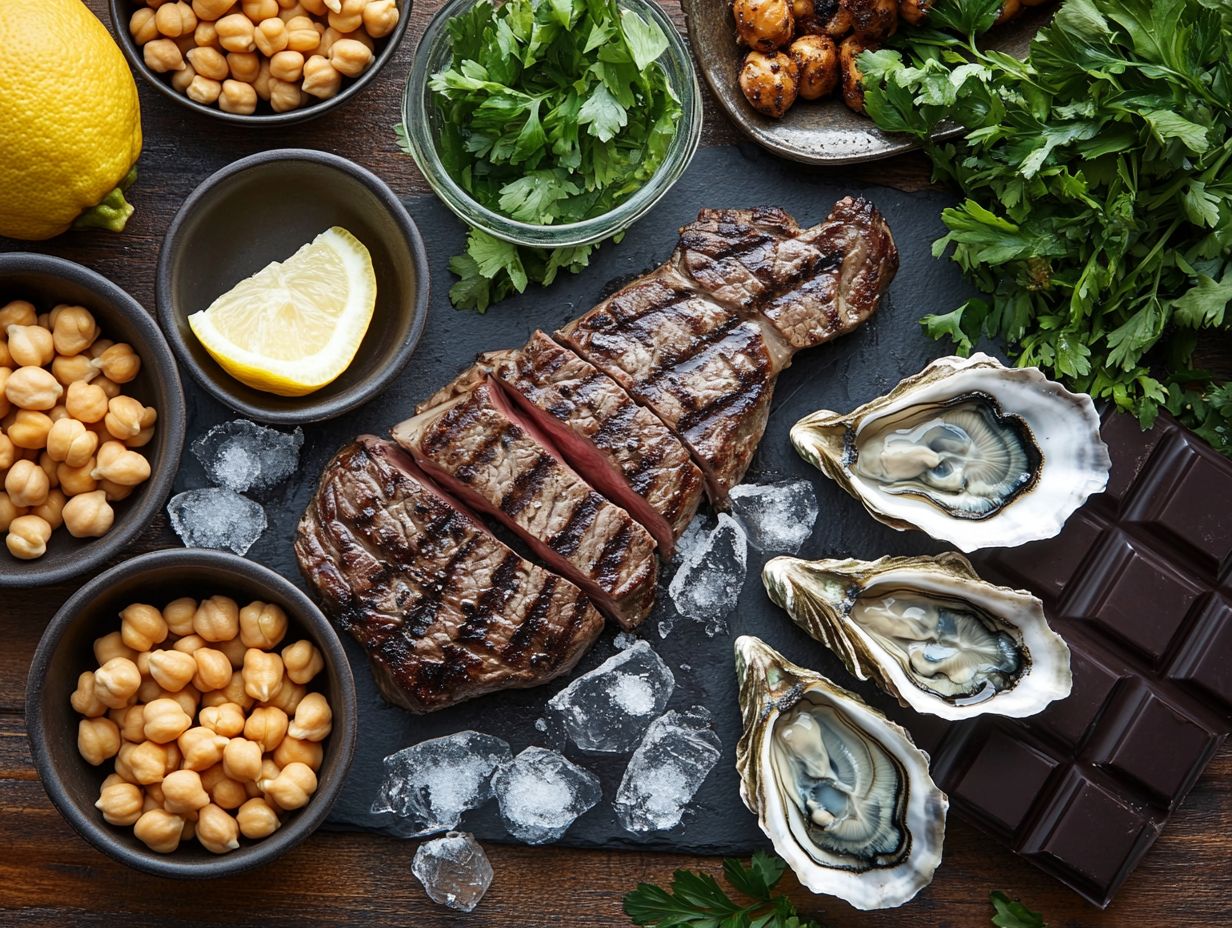
Zinc deficiency can lead to various unsettling symptoms, such as impaired immune function, increased oxidative stress, and delayed wound healing. This underscores the critical importance of maintaining optimal zinc levels for your health.
If you find yourself grappling with this deficiency, you might notice that your immune system struggles, making you more susceptible to infections and leaving you vulnerable to pathogens.
Chronic conditions like age-related macular degeneration can worsen with inadequate zinc levels, potentially leading to visual impairments that you want to avoid.
Certain groups are particularly at risk for zinc deficiency. For example, people with digestive disorders may struggle to absorb nutrients effectively. Individuals with alcohol use disorder often lose more zinc, amplifying their risk of deficiencies and associated health complications.
Prioritizing zinc in your diet is not just beneficial; it s essential for your well-being! Don’t wait boost your zinc levels for a healthier you!
What Are the Risks of Consuming Too Much Zinc?
Zinc is undeniably important for your health. However, overdoing it especially through supplements can lead to unwelcome side effects like nausea and headaches. Excessive zinc intake can also interfere with how your body absorbs other essential minerals. This highlights the need for moderation in your zinc intake.
If you exceed the recommended dosage, particularly if you have existing health conditions, you could face complications such as a weakened immune system and fluctuating cholesterol levels.
Furthermore, an excess of zinc can impede the absorption of vital nutrients like copper and iron. This could potentially worsen any health issues you may have.
Therefore, sticking to the recommended limits for zinc supplementation generally around 40 mg per day for adults is crucial. This ensures your body receives the right balance of micronutrients needed for optimal functioning.
How Can These Foods Be Incorporated into a Balanced Diet?
Incorporating zinc-rich foods like oysters, beef, pumpkin seeds, and chickpeas into your balanced diet is vital for promoting overall health. This is especially important if you’re looking to enhance your immune function and nutrient absorption.
Achieving this can be simple with thoughtful meal planning and a dash of culinary creativity. For instance, top your salads or yogurt with a sprinkle of pumpkin seeds for a delightful crunch. Alternatively, toss chickpeas into soups or stir-fries to give your meals a protein boost.
When preparing meals, strive for a balance that includes various sources of zinc. Pair grilled beef with hearty vegetables or add oysters to your seafood pasta dishes.
Planning your meals in advance can help maintain this balance, ensuring that zinc-rich foods are regularly featured alongside other essential nutrients in your wholesome routine.
Are There Any Other Sources of Zinc Besides Food?
Beyond relying solely on dietary sources, zinc supplements present a valuable alternative for those who may find it challenging to meet their zinc requirements through food alone. This is particularly true for individuals facing specific health conditions or digestive disorders that hinder nutrient absorption.
These supplements are available in various forms, such as:
- Zinc gluconate, a common form of zinc used in supplements
- Zinc acetate
- Zinc picolinate, often celebrated for how well your body can use it
Each form boasts different absorption rates and effectiveness. While supplementation can enhance immune function and support wound healing, it s essential to remain mindful of potential risks. These include gastrointestinal discomfort and interference with the absorption of other minerals.
Consulting with a healthcare provider before starting any zinc regimen is crucial. This ensures safety and appropriateness tailored to your individual health needs.
Watch this video for more insights on zinc intake.
Frequently Asked Questions
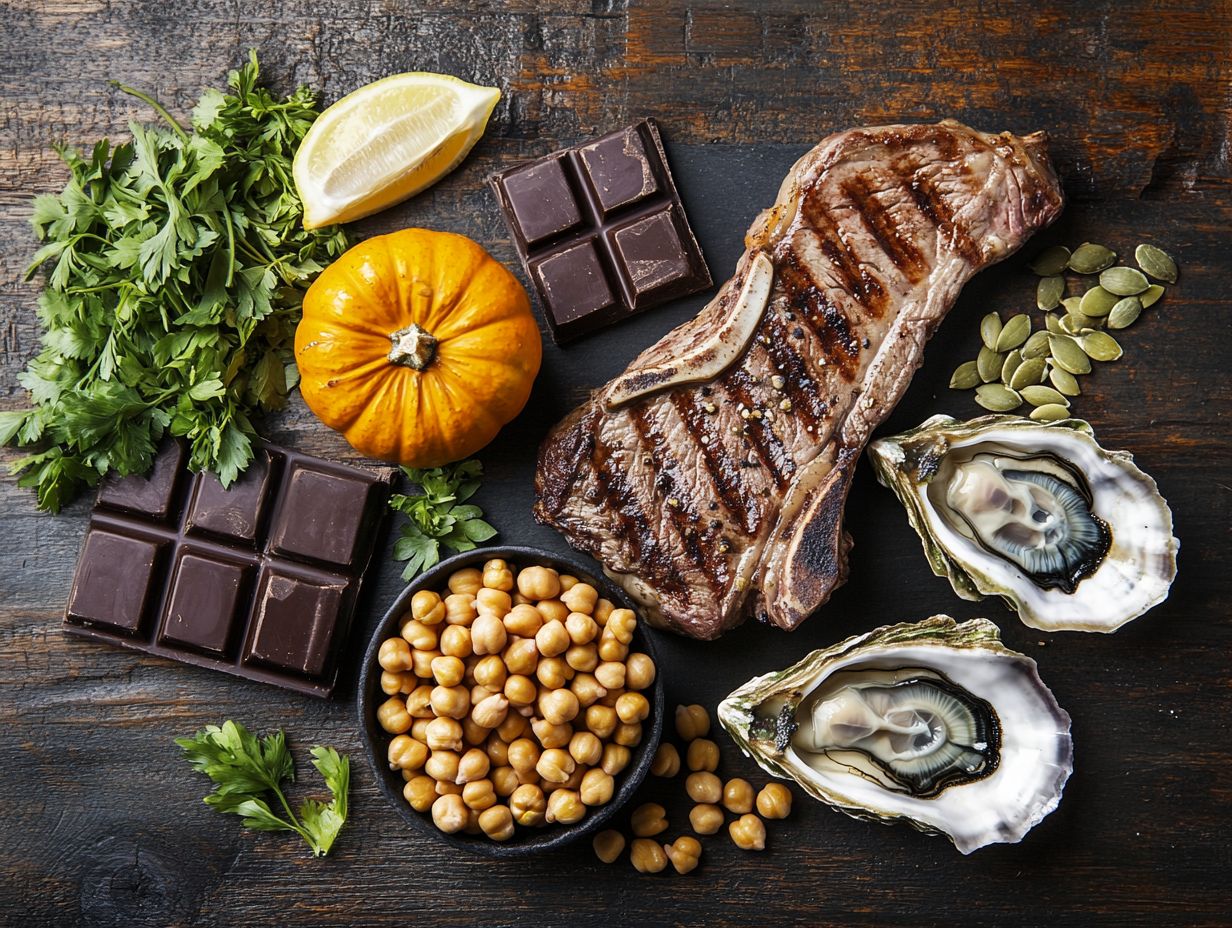
What are the 5 foods recommended for getting daily zinc intake?
The 5 foods recommended for getting daily zinc intake are oysters, beef, chicken, beans, and nuts.
Why is it important to get enough zinc in our daily diet?
Zinc is an essential mineral that plays a crucial role in various bodily functions. These include immune system support, wound healing, and cell growth and division.
How much zinc do we need in our daily diet?
The recommended daily intake of zinc varies depending on age and gender. For adults, the recommended daily allowance (RDA) is between 8-11 milligrams, varying based on specific needs.
Can vegetarians and vegans get enough zinc in their diet?
Yes, vegetarians and vegans can get enough zinc by including plant-based sources such as beans, nuts, and fortified cereals in their meals.
Are there any risks associated with consuming too much zinc?
- Nausea
- Vomiting
- Diarrhea
- Interference with the absorption of other essential minerals like iron and copper
What are some signs of zinc deficiency?
Signs of zinc deficiency include frequent infections, slow wound healing, hair loss, and loss of appetite. It is important to consult a healthcare professional if you suspect you may have a zinc deficiency.

